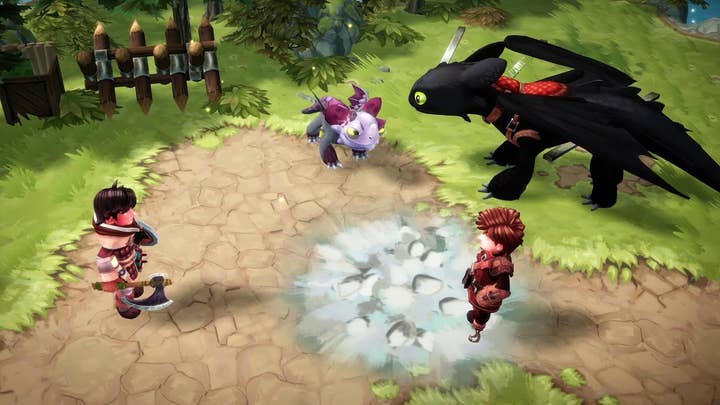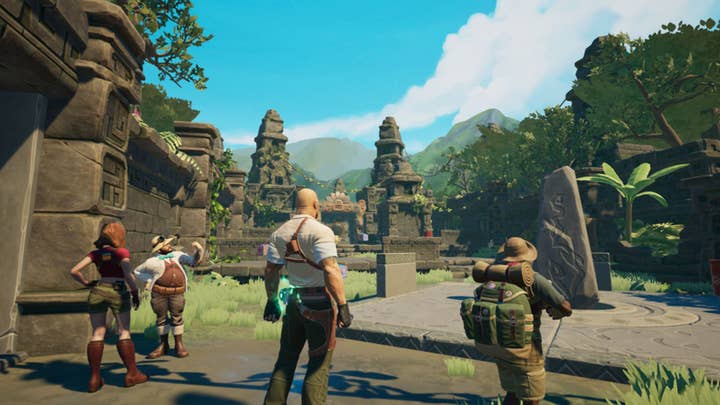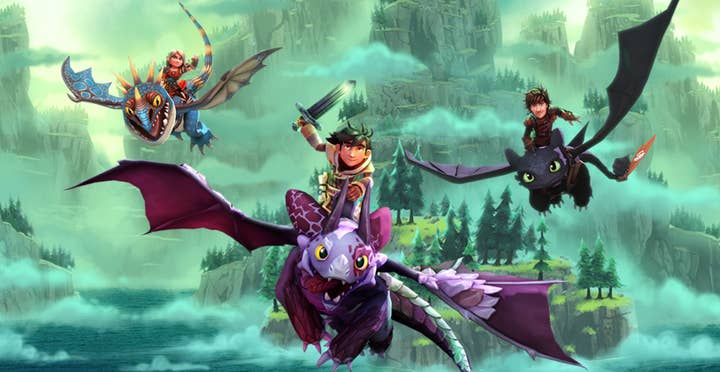"If you're trying to make the game of the film, you're onto a loser"
Outright Games' Nick Button-Brown explains how the publisher is trying to break the stigma around licensed kids games
Not so long ago, video games based on family films or kids TV shows were abundant. Now such titles are few and far between -- but one publisher believes it can build a business around them.
Outright Games has been operating quietly for a little under three years. It has already released titles based on How To Train Your Dragon, Paw Patrol, Adventure Time and Steven Universe, with Jumanji and Ice Age outings on the way. All popular names, but the company seems to be specialising in a business model many presumed dead.
"It's a really narrow focus," admits Nick Button-Brown, chair of Outright's board of directors. "But the argument is that it's quite a good niche. If you deliver a licensed game for a kid, you know it's going to sell a certain amount, and that Walmart are going to stock it. It's a good, solid niche."
Thing is, this wasn't always a niche; it was once big business. Major publishers like Activision and THQ used to generate much of their revenue from these type of games, and yet both firms gradually retreated from licensed kids games.
"You can still point the finger and say that's what took down THQ," Button-Brown says. "It was part of the reason, at least."
"If you're trying to make the game of the film, you're on kind of a loser... Game stories need more variation, more options, more agency within them"
But, he argues, both publishers "kinda got carried away." THQ, for example, had a deal with Pixar to produce game adaptations and even sequels for each of its movies. The result was at least four Cars games, three Incredibles titles and three Finding Nemo tie-ins. The deal became too expensive for THQ (or similar publishers) to maintain, says Button-Brown. As more and more publishers moved in on the licensed kids space, IP holders could charge more for their licence and the games needed to sell more to recoup that cost.
"The market isn't the same now," he says. "A Pixar game doesn't sell the same amount of units today, but it will sell a certain number of units. We did How To Train Your Dragon, which is a really nice game. It's not going to sell ten million units; it's not going to sell five million, but it's going to sell a number of units. So as long as you're sensible about what you're making, you can make a game for that number.
"We don't have to sell a lot of units to make money. We don't have EA's overheads. We're building games to scope. If you take a slightly younger IP, you want to build a simpler game, and because you're building a simpler game, it costs less to make, which means you can actually break even fairly quickly. At the same time, younger IPs are harder and it's tougher to find the right game. We did a Paw Patrol game, which was a really good game for us because everybody knows Paw Patrol. Retailers know if they put Paw Patrol on something, it will shift."
You'd be forgiven for thinking conservative sales expectations limit the type of licences Outright has access to. But Button-Brown is optimistic about securing bigger IP as the company grows, if only because "nobody is making those games anymore" when it comes to console and PC.

"It's not like there's a bunch of publishers competing and they're having to auction against each other to get the licences," he says. "The choice for a lot of the licensors is to work with us or work with somebody that isn't very good. We aim to give them something that is good. It's not going to be a huge open world, but it will be something that's faithful to the IP and it's not going to piss off the IP holders."
His last point refers to another factor behind the decline of licensed games: poor quality. Oftentimes, games were rushed to meet the deadline of a film release or just not given the care a licensor hoped for, leading to low sales and negative reviews. For many players, this remains the impression they have of licensed tie-ins, but Outright hopes to change that over time.
"It's definitely still a stigma," Button-Brown acknowledges. "We can overcome it by making better games. Not everything we make will be better, and sometimes you do just want a game out for a film and you don't have enough time because the studio hasn't given you enough time. You've only got 12 months so you've just got to get on with it.
"We don't have to sell a lot of units to make money. We don't have EA's overheads. We're building games to scope"
"But what we want to do is spend a little more time on the games, work with developers. Perhaps more indie developers who have got something they want to do or a style of game they want to play with. We quite like that, taking something they've already been working on and making a good game that happens to have a licence on it."
A prime example is the forthcoming Ice Age: Scrat's Nutty Adventure, which is being developed by UK studio Just Add Water. Button-Brown doesn't go into detail but does suggest the foundations lie in something the developer was already experimenting with.
It's also one of the more interesting titles Outright has in development. While Jumanji will arrive alongside the new movie and Race with Ryan is the result of a collaboration with the young YouTube star whose toy reviews are watched by 20 million subscribers, Ice Age seems a less relevant. There hasn't been a new film since 2016, with no concrete word on another ever being made.
Yet Button-Brown is convinced this can still be enough of a hit for Outright thanks to the established fanbase, and the fact that young children are still discovering the Ice Age films for the first time.
"You don't have the same kind of focus [without a new film], but also you don't necessarily have the same drop-off. If you've got a film that's coming out, two months later the film feels old. Whereas if you have a Scrat game, hopefully that will last a little bit longer. We'll see how it goes."
Equally, Outright is keen to avoid the 'game of the film' model of the past, as it has with How To Train Your Dragon. Released earlier this year alongside the third film, this actually tells an original story but features all the familiar characters.

"If you're trying to make the game of the film, you're on kind of a loser because you're dealing with scripts that are late and you're trying to match a story that doesn't really fit for games... Game stories need more variation, more options, more agency within them. In films, you're passive. So a story that works fantastically well for films doesn't work for games. It's actually better to have the freedom to do something within the universe, for them to let the developer to get on with it."
The most obvious challenge Outright faces is mobile. Perhaps the most significant fact in the decline of licensed kids games is that the audience shifted its attention to smart devices, and the licensors simply followed them. If a family-friendly property does have a tie-in today, it's more likely to be a base-builder, character-collecting RPG or match-three than it is a 3D platforming adventure.
Button-Brown agrees, pointing to Minion Rush as proof of how much revenue a mobile tie-in can generate versus a more costly console outing, but he notes that, with app stores being so crowded now, not all licensors are able to replicate that success.
"As people go into the next consoles they hand down the current versions. At the end of console cycles, licensed games tend to do particularly well"
"Mobile is a difficult market," he says. "At the same time, lots of people have consoles. It's a difficult market, but not in the same way. We've got How To Train Your Dragon on Switch because you know people will buy games on Switch. People are seeing it and buying it, and they're buying it digitally. Parents are buying it for their kids because it's a good, safe experience.
"There's a lot of hand-me-down consoles. As people go into the next consoles they hand down the current versions. At the end of console cycles, licensed games tend to do particularly well."
The term "good, safe experience" is critical here, as mobile is often criticised for how aggressively it monetises its audience, particularly children. Outright Games positions itself as a family-run company -- literally, since CEO Terry Malham works alongside his son and daughter, while Button-Brown's much younger kids will "happily test the games."
As such, the publisher is determined to steer clear of the free-to-play model, or even the loot box mechanics that have found their way into console and PC titles. The focus is to have self-contained experiences that explore the universe they license and perhaps tell a story that adds to it.
"I want to provide safe experiences, and safe means we're not going to do microtransactions games... I like that you buy a game, you take it home, and you have fun with it."
It's an admirable view, but one that seems to be in the minority. As Button-Brown himself said, licensed kids games are a niche, but could the industry shift back to this model for adapting family-friendly entertainment brands? Or at least balance against mobile titles that merely use them as a skin for the same gameplay loops?
"I really hope so. You see licensed slots games, but they're not really using the license, they're just using it for recognition. A lot of mobile games are just using it for user acquisition -- and I entirely understand that. But it's not adding to the stories.
"Hopefully we can provide additional stories that are adding to your love of what's going on. Hopefully you play the Ice Age game and you've got a different story within the universe that makes you love Ice Age a bit more. We're definitely going to focus on providing complementary experiences. Even if we went onto mobile, it would need to be something complementary with a console game we were doing.
"That's what we've been telling licensors. We want to do something that makes their IP stronger, and we want them to work with us. Let's work together on telling a story that makes your universe better. And that's not altruistic. That's what I want to play."









